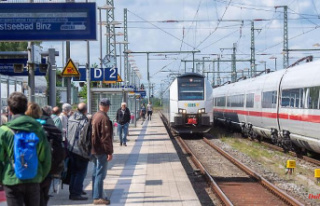The decline in the number of corona cases seems to have ended for the time being. It is possible that the corona numbers will rise again in autumn. Federal Minister of Health Lauterbach is already preparing for the possible autumn wave, but encounters reservations from the ranks of the FDP.
Federal Health Minister Karl Lauterbach has shown himself confident that he can convince the coalition partner FDP to extend the Infection Protection Act and the obligation to wear masks. With a view to a possibly more critical corona situation in autumn, the SPD politician said on ZDF that Germany will “definitely have an infection protection law beyond September 23, which gives us the preparations we need”. The previous legal basis for the protective measures will expire on September 23. With a view to the mask requirement and the FDP, Lauterbach added: "I think we'll agree there."
The FDP, which wants as few corona protection measures as possible, insists on waiting for several expert reports. The Prime Ministers of the federal states and Chancellor Olaf Scholz had agreed to take early precautions for a more critical corona situation in autumn. Scholz then said that all options for action that were needed should be available - but there should no longer be comprehensive closures of schools and daycare centers.
The state health ministers had unanimously put together a possible catalog with mask requirements indoors and access rules such as 2G and 3G (access only for vaccinated, recovered or tested people).
Green health expert Janosch Dahmen welcomed the joint intention of the federal and state governments. In addition to a targeted vaccination campaign and test strategy, better data is particularly important, said the member of the Bundestag. In the federal states, the focus must be on rapid digitization in the public health service and on up-to-date data - for example on the availability of hospital beds that can be operated and on the capacities of emergency rooms and rescue services.
The German District Association also called “mask requirements indoors and on public transport, possibly also contact restrictions”. States and municipalities should not have their hands tied if it becomes necessary locally, demanded district council president Reinhard Sager at the editorial network Germany.
The German Foundation for Patient Protection called for the free citizen tests in test centers to be extended beyond June. At the moment, more than 100 people die from or with Corona every day, said board member Eugen Brysch to the RND. The federal states had already asked the federal government at the Prime Ministers' Conference to continue funding the free citizen tests.
According to the Robert Koch Institute (RKI), the steady decline in the number of cases could be stopped for the time being: In the current week it is stagnating, the institute announced on Thursday evening. The proportion of the omicron subline BA.5 is doubling from week to week - albeit at a low level: According to the RKI, it is 5.2 percent.
On Friday, the RKI gave the nationwide seven-day incidence of 261.3. The day before, the number of new infections per 100,000 inhabitants per week was 221.4 (previous month: 632.2). However, the incidence does not provide a complete picture of the infection situation. Experts have been assuming for some time that there will be a large number of cases not recorded by the RKI - due to overworked health authorities and because not all infected people have a PCR test done. Only positive PCR tests count in the statistics. In addition, late registrations or transmission problems can lead to a distortion of individual daily values.
Virologist Klaus Stöhr, on the other hand, sees no danger and accuses Lauterbach of scaremongering. "This includes this whole threat scenario, which the Ministry of Health is building up again," he told the Welt television station. It is possible that the BA.5 virus variant, as in Portugal, will lead to a renewed increase in cases. "On asymptomatic cases, but not in the intensive care units, not in the hospitals - there is complete relaxation." Stöhr, as the successor to the Berlin virologist Christian Drosten, is to move into the commission for the scientific assessment of state corona restrictions at the Union's suggestion.












